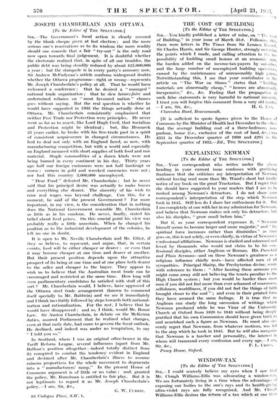JOSEPH CHAMBERLAIN AND OTTAWA
[To the Editor of THE SPECTATOR.] SIR,--The Government's fiscal action is clearly covered by the blank cheque given at last election ; and the more serious one's reservations as to its wisdom the more readily should one concede that a fair " try-out " is the , only road now open towards final judgement. • -It is doubtful whether the electorate realized that, in spite of all our troubles, the public debt was being steadily reduced by about £25,000,000 a year : but the stampede is in every party's armoury now. Sir Andrew McFadyean's article confirms widespread doubts whether the Ottawa programme—right or wrong—represents Mr. Joseph Chamberlain's policy at all. That he would have welcomed a conference ; that he desired a " managed " national trade organization ; that he slew laissez-faire and undermined reliance on " most favoured nation " clauses goes without saying. But the real question is whether he would- have supported in 1938 the things actually done at Ottawa. Mr. Chamberlain consistently emphasized that neither Free Trade nor Protection were principles. He never went so far as to assert, like Lord Hugh Cecil, that Socialism and Protection might be identical ; but, like Bismarck 25 years earlier, he broke with his free-trade past in a spirit of consistent acquiescence in changed circumstances. He had to deal not only with an England faced, as now, with manufacturing competition, but with a world and especially an England menaced with short supplies of both food and raw material. Staple commodities of a dozen kinds were not being burned in every continent in his day. Thirty years ago half our foreign customers were not half bankrupt or worse : corners in gold and wrecked currencies were not : nor had this country 3,000,000 unemployed.
" Dear Food " defeated Mr. Chamberlain : but he never said that his principal desire was actually to make loaves and everything else dearer. The sincerity of his wish to raise real wages was beyond challenge. Can this, for a moment, be said of the present Government ? Far more important, in my view, is the consideration that in nothing does the National Government resemble Mr. Chamberlain so little as in his candour. He never, finally, stated his belief about food prices. On this crucial point his view was probably really a little uncertain. When he changed his position as to the industrial development of the colonies, he left no one in doubt.
It is open to Mr. Neville Chamberlain and Mr. Elliot, if they so believe, to represent, and argue, that, in certain events, food will be either cheaper or dearer : or even that it may become cheaper at one time and dearer at another. But their present position depends upon the attractive prospect 'of its being at one time and at one place both dearer to the seller and cheaper to the buyer. They appear to wish us to believe that the Australian meat trade can be encouraged and restricted at the same time. How long will even parliamentary candidates be satisfied with stuff of this sort ? Mr. Chamberlain would, I believe, haVe approved of the Ottawa steel trade arrangement (known to commend
itself specially to Mr. Baldwin) and we see it immediately and I think inevitably followed by steps towards both national- ization and rationalization. For the rest, I believe that he would have disapproved : and so, I think, would Mr. Bonar Law. Sir Austen Chamberlain, in debate on the McKenna duties, assured Parliament that he realized what changes, even at that early date, had come to govern the fiscal outlook. He declined, and indeed was under no temptation, to say " I told you so."
In Scotland, where I was an original office-bearer in the Tariff Reform League, several influences (apart from Mr. Balfour's position altogether—indeed totally distinct from it) conspired to combat the tendency evident in England and destined after Mr. Chamberlain's illness to assume ruinous proportions for the whole movement to degenerate into a " manufacturers' ramp." In the present House of Commons argument is of little or no value and, granted the policy, Mr. Runciman is entitled to fair play. But it is not legitimate to regard it as Mr. Joseph Chamberlain's policy .—I am, Sir, &c.,
83 Cadogan Place, S.W. 1. G. W. CURRIE.






































 Previous page
Previous page